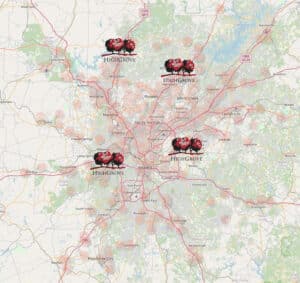 The term greywater is popping up quite often in sustainability circles when it comes to irrigation.
The term greywater is popping up quite often in sustainability circles when it comes to irrigation.
While the term itself might bring up images of a fairly strange-colored pool of sludge, many of you may be wondering what it is exactly as you hear all the positive comments about greywater use.
That’s why we’re here: to take those images you’ve conjured up in your head and replace them with education and practical use.
Let’s talk about greywater.
So, What is Greywater?
Generally speaking, greywater is defined as wastewater that does not contain serious contaminants. So, water from a sink or shower might be greywater, but water from toilets would not be greywater. Regulated by state and local governments, definitions for greywater can get more specific based on the differences stated by each of these entities.
In Georgia, for instance, with growing populations and limited amounts of fresh water available, water conservation and efficient water use has become important. The state has greywater recycling system guidelines to help building owners and water authorities decide whether using greywater for toilet flushing or subsurface landscape irrigation is possible.
Greywater’s Use in the Landscape
 There are many types of greywater systems for landscape irrigation use. Needless to say, a greywater system must be carefully designed and planned, determining how much greywater is produced daily, the property’s water demands, how much storage is necessary to meet these demands and how the water will be distributed.
There are many types of greywater systems for landscape irrigation use. Needless to say, a greywater system must be carefully designed and planned, determining how much greywater is produced daily, the property’s water demands, how much storage is necessary to meet these demands and how the water will be distributed.
All greywater systems involve some type of filtering of the water to remove any particulates before it circulates through the system. It’s also common for them to disinfect the water to an extent, to minimize risks should animals or humans come in contact with it.
Then, correctly filtered and disinfected greywater can be applied through relatively normal irrigation systems. The University of Georgia recommends applying greywater at or slightly below the soil surface — such as surface broadcasting by soaker hose — so standing puddles and runoff does not occur, and so water is targeted at plant roots. Any greywater irrigation system design should have easy accessibility for performing regular inspections and maintenance.
Georgia’s rules state that the work to install greywater subsurface irrigation systems must be performed by a Department of Human Resources–certified on-site septic installer working under a permit obtained from the local county board of health.
All greywater systems must also be identified with a label or signage.
Smart Water Rules Still Apply
Tips for using greywater tend to reflect those for using any water. Smart and efficient irrigation is a must.
For instance, trees and shrubs are typically considered high-priority watering items because of their individual value, so in times of drought these are at the top of the list. And greywater should be used as supplemental irrigation when natural precipitation and normal irrigation water is not available.
More Greywater Questions? We’ve Got Answers!
As experts in landscape irrigation, HighGrove Partners can help you determine whether greywater is an option for your commercial property. Our experienced professionals can assess your current irrigation system and water usage and come up with a plan that can save you water and money.
Call us at 678-298-0550 or use our simple contact form for a free consultation!




